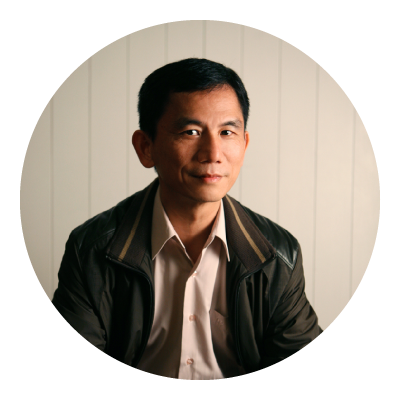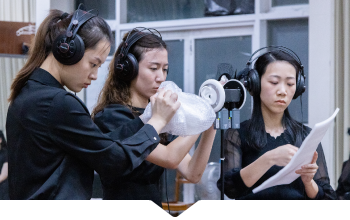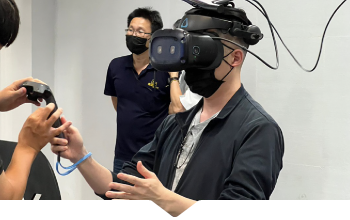History:
The College of Metaverse, established in 2022, is the first of its kind in Taiwan. Its founding is a response to the emerging trends in the
application of digital art derived from the development of the metaverse. The college aims to cultivate forward-thinking talents in
interdisciplinary digital art research, creation, and management, as well as explore how to present digital art in the metaverse world.
It serves as an institution dedicated to studying the cultural and social ecosystem of the metaverse.
The college is composed of several departments, including the Executive Master of Arts Administration (established in 2019) and the Graduate
Institute of Sound Technology (established in 2021). The Master's program in the Metaverse will be officially established in 2024, completing
the overall structure of the college as shown in the following diagram.
Current Status :
In 2022, the college was founded as a graduate institute and a master's program with seven full-time faculty members. The Graduate Institute of
Sound Technology is Taiwan's first independent research institute specializing in sound technology. It uses English as a medium of instruction
(EMI) and aims to cultivate professionals in sound technology and audio engineering with international skills. The institute also explores
immersive auditory experiences in the metaverse environment. The faculty members have expertise in interdisciplinary studies and sound technology.
They provide instruction in academic expertise and draw on their industry experiences to offer knowledge on interdisciplinary fields and current
industry practices.
The Executive Master of Arts Administration(EMAA) is a pioneering initiative that cultivates managerial talents in the art industry for elites.
The faculty team consists of experts from industry, government, and academia. The students are distributed among various industry elites,
including technology, arts and culture, public relations, education, healthcare, and government sectors.
The curriculum is rooted in art management and incorporates specialized content in law, technology, and big data. It promotes active participation
and encourages cross-disciplinary exchanges within various art fields. The program integrates the latest technology with art, humanities, and
cultural creativity to facilitate cross-disciplinary academic integration and research. Its objective is to develop management professionals who
possess expertise in both artistic creativity and law, while also exploring the future social and work patterns in the metaverse era from
humanistic, artistic, and legal perspectives.
Characteristics and Niche :
1. As the first and currently the only college-level Metaverse research unit in Taiwan, this college is entirely composed of brand-new
departments that foster a culture of innovation and experimentation. It covers up-to-date topics such as TMT (Technology/Media/Telecom), the
metaverse, blockchain, non-fungible tokens (NFTs), and other areas related to art, technology, finance, and law. This interdisciplinary approach
opens up new avenues of research and explores the possibilities of emerging fields in art associated with the metaverse. It is in line with the
university's philosophy of "art as the body and technology as the tool."
2. The EMAA program offers data science courses and related information technology that utilize big data as material and machine learning as the
method. These technologies are combined with the current third wave of artificial intelligence to demonstrate their cutting-edge capabilities and
future potential in content-assisted creation and business marketing analysis. The program also employs open-source software for data mining,
establishes a mindset for data analysis, and cultivates a new generation of talent in art creation and management.
3. EMAA students are already employed in relevant industry venues and institutions, which allows them to apply their learning in their daily
work. After graduation, students become alumni who can establish a direct connection between their workplaces and the program. This creates a
mutually beneficial environment for collaborative education, shared resources, and faculty development.
4. Our university is one of three art universities in Taiwan and the only one located outside the Greater Taipei area. The college has taken
the lead in research and teaching related to the metaverse, establishing an important hub in Tainan. This helps balance regional development and
avoids excessive concentration of resources in the northern part of Taiwan, providing local learning opportunities for aspiring students in the
southern region.
Department
Dean of the
College of Metaverse

Huang, Jiung Yao
I got my Bachelor degree in Department of Apply Mathematics from National Chung-Hsing University, Taiwan, in 1983. After served my two years of military obligation, I went to Department of Computer Science, National Tsing-Hua University, Taiwan, for my Master degree in 1988.
I went US for my doctoral degree in September 1988. In 1993, I received my Ph.D. degree from Department of Electrical and
Computer Engineering, University of Massachusetts, Amherst, MASS. After I earned my Ph.D. degree, I taught in Department of
CS&IE, Tamkang University, TAIWAN, until July 2003. I then moved to Department of Communication Engineering at National Chung
Cheng University, Min-Hsiung, Chia-Yi, Taiwan. Two years later, I transferred to Department of Computer Science and Information
Engineering, National Taipei University, until 2017.
My current research interests include Distributed Operating System for Simulator, Networked Virtual Reality System, and Pervasive
Computing.
Education Background:
1993-1989
Ph.D. in Computer Science and Electronical Engineering, University of Massachusetts at Amherst, MA, USA
1988-1986
M.S. in Computer Science, National Tsing Hua University, Taiwan
1983-1979
B.S. in Applied Mathematics, National Chung Hsing University, Taiwan
Admission for
Overseas Students
Please select the corresponding identity and download the file.


